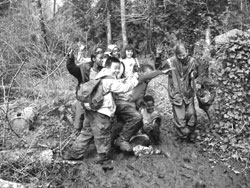|
 Students
Learn Outdoors in the Pacific Northwest Students
Learn Outdoors in the Pacific Northwest
by Brendan
Kiley
Snuggled
in the woods of Bainbridge Island, just a 35-minute ferry ride
from Seattle, the newly-opened Puget Sound Environmental Learning
Center (PSELC) provides students with new ways to get their
hands dirty.
Founded in 1998, the PSELC seeks to yoke together science, technology
and arts education, using hands-on learning in a verdant setting.
Primarily offering four-day overnight programs for area students
in grades three through six, the Center’s attendees learn
through exploring inter-tidal ecosystems, mapping the boggy
areas of a watershed and testing a local pond’s water
quality before bringing their data back into the classroom for
careful analysis.
“We
want to take an experimental approach to serious learning,”
says Pat Guild O’Rourke, the Center’s Director of
Education. “We want the students to see the seriousness
that can happen from learning when their experience comes first.”
At
the time of its official opening in September, the Center anticipated
that over 7,000 students, children and adults will pass through
its doors annually. In addition to overnight programs for elementary
school students, graduate students, teachers and families can
attend classes in nature photography, furniture-building and,
using the Center as an example, sustainable design. 
“We
incorporated green materials to show the public what we can
do with green building,” said Communications coordinator
Christine Llobregat. The PSELC’s founders visited over
20 centers and conducted extensive group meetings with the island
community before designing the site.
“Our
buildings teach,” explained Denise Dumochel, School and
Teacher Programs Coordinator. In the classrooms, students stride
across floors made of bamboo, cork and recycled tires and study
on countertops made from recycled yogurt cartons. The Center
boasts passive and active solar energy and a “living machine”–a
wastewater treatment system utilizing plants. “We try
to model developments in sustainable design,” Dumouchel
said, “which is a dream for many residential programs
I’ve worked for before.”
After
the success of a ten-school pilot program, the PSELC is booked
through the 2002-2003 school year. The Center, however, carefully
tries to balance and represent the total variety of the Seattle
area. Private and public schools from districts urban and rural,
wealthy and needy, have been encouraged to participate. According
to Dumouchel, the Center aims at providing education with powerful
personal experiences: “The affective domain has to come
first.”
The
programs seem to be working. Besides coming away with a greater
education about the interrelatedness of human and ecological
systems, students have learned how to get along with one another.
This success fulfills one of the Center’s primary missions–education
that provides an integrated sense of social and ecological stewardship.
Dumouchel’s favorite anecdote involves a group of homeless
students who entered the April pilot program. After they returned
to their regular school, their recess monitor called the PSELC,
wondering “what it had done to them.”
“For
the first time, the kids were playing together without trying
to hurt each other,” Dumouchel said. “A lot of this
relies on our ability to meet the children where they are when
they arrive. It’s a very powerful experience for a lot
of these kids.”#

Education
Update, Inc., P.O. Box 20005, New York, NY 10001.
Tel: (212) 481-5519. Fax: (212) 481-3919.Email: ednews1@aol.com.
All material is copyrighted and may not be printed without express
consent of the publisher. © 2002.
|
